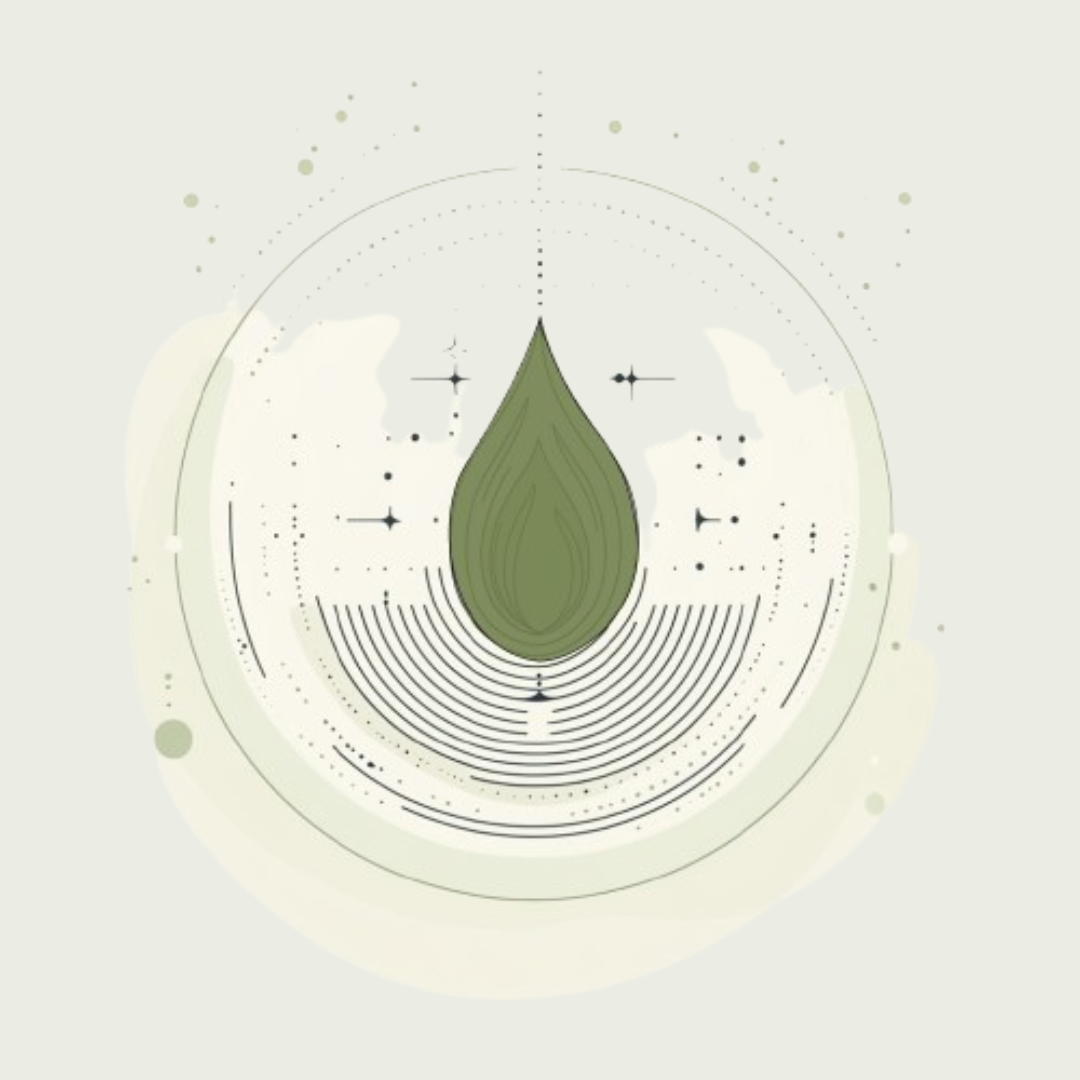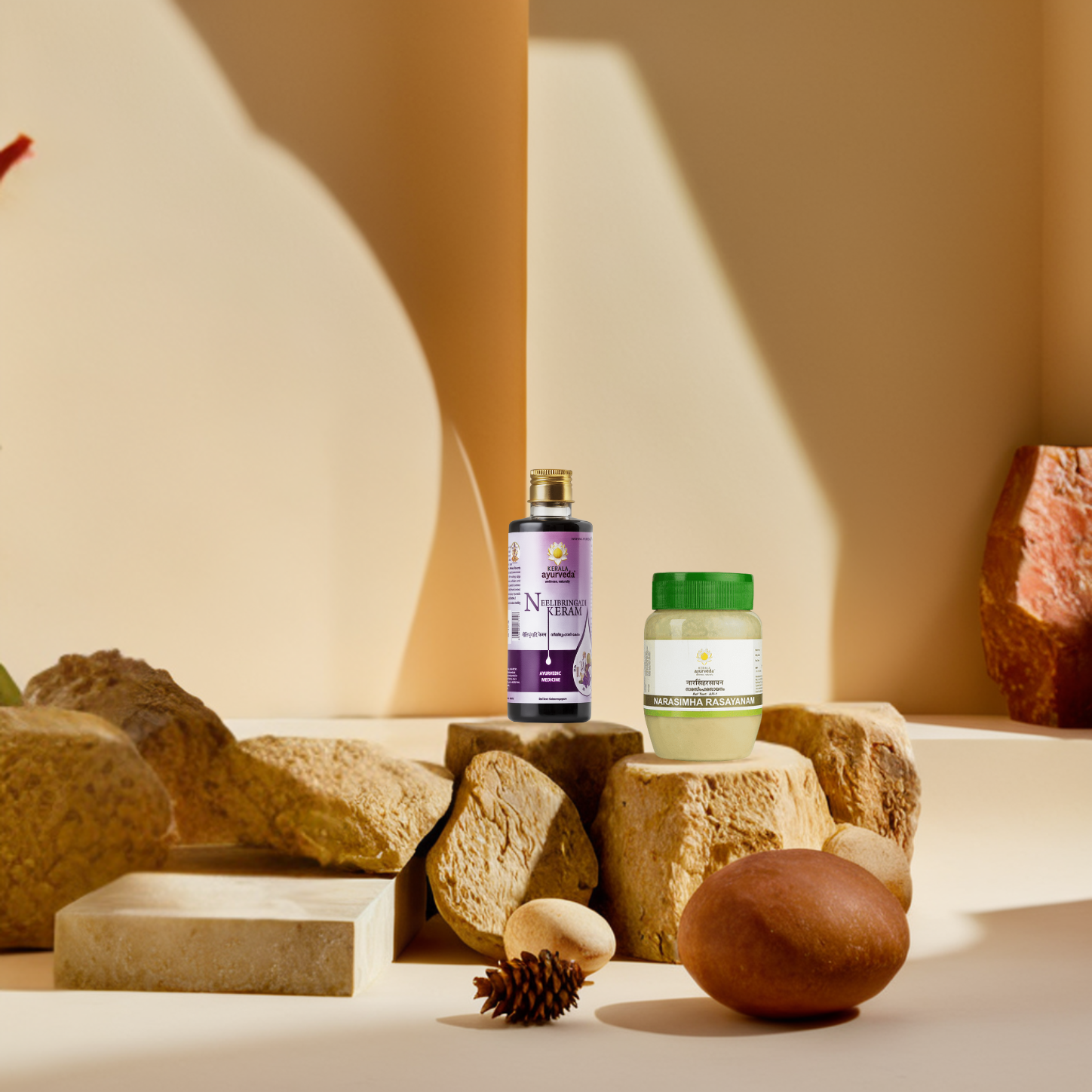Cold hands even under layers. Dry skin, no matter how much you moisturize. And what’s with waking up at 3 AM for no reason? It’s easy to brush these symptoms off as random, but when they start adding up every day, they leave you feeling a little off, unsettled, low on energy, and not quite yourself.
If this sounds familiar, you're not alone. Busy routines, irregular meals, and constant screen time take a toll on your body in ways that you don't always notice.
Ayurveda connects these patterns back to your body's natural energies, which are Vata, Pitta, and Kapha. Each energy plays a role in keeping your body's system balanced.
Vata, or Vayu, is the energy that governs movement, circulation, and the nervous system. When Vata is out of balance, it can cause disturbances like poor circulation, dryness, and restless energy.
Understanding Vata dosha is the first step to identifying what's causing those everyday imbalances. Once you know what's at play, you can take action to restore balance and feel like yourself again.
What is Vata Dosha?
As per Ayurveda, your body runs on three core energies (Tridoshas):
- Kapha provides structure and stability. It keeps your body strong, your joints lubricated, and your mind steady.
- Pitta is the fire within you. It governs digestion, metabolism, and focus.
- Vata is movement. It controls everything that flows: your breath, circulation, digestion, and even your thoughts.
Unlike Kapha's grounding nature and Pitta's intensity, Vata is light, quick, and ever-changing, much like the wind. It gives you energy, creativity, and flexibility. It keeps everything in motion, from your breath and circulation to digestion and thoughts.
But just like the wind, if it becomes too strong or erratic, you may feel scattered or anxious, notice dryness in your skin, struggle to sleep, or face digestive discomfort.
The key to keeping Vata in harmony is maintaining stability with its movement through warm, nourishing foods, a regular daily routine, and mindful practices that ground your energy.
How Does Vata Function in Your Body?
Vata (or Vayu) isn’t just one force. It functions through five sub-types, each with a distinct role in keeping movement and energy flow balanced in your body:
- Prana Vayu: The life force behind breathing, heart function, and swallowing. It also influences willpower, vision, and intellect.
- Apana Vayu: The downward-moving energy that controls elimination (bowel movements, urination) and reproductive functions like menstruation and childbirth.
- Vyana Vayu: The circulatory force that keeps blood flowing, muscles moving, and joints flexible. It even regulates sweating.
- Udana Vayu: The uplifting energy that powers speech, breathing, self-expression, and vitality. Think of it as the force behind your voice and enthusiasm.
- Samana Vayu: The digestive balancer that ensures food moves properly through the stomach and intestines while supporting nutrient absorption and digestive fire (Agni).
Natural Vata Traits vs. Vata Imbalance: What’s the Difference?
If you naturally talk fast, love movement, and feel creative and energetic, you're likely Vata-dominant. Being Vata by nature means your body and mind naturally align with lightness, quickness, and adaptability. These traits don't necessarily signal an imbalance; they're simply part of your natural body type or an Ayurvedic constitution (Prakriti).
But when these qualities start to feel too much, restlessness turns into anxiety, light sleep becomes full-blown insomnia, or your skin feels perpetually dry. This points to a Vata imbalance rather than just your natural constitution.
Vata is sensitive to change. Skipping meals, eating too many dry or cold foods, consistent stress, or lack of rest can easily throw it off balance. If you've been feeling a little unusual with these symptoms, Vata's imbalance might be the reason.
- When Vata is high, you feel a little unsteady than usual, thoughts race, the body feels dry and restless, and warmth seems harder to hold onto.
- When Vata is low (Vata Kshaya), you feel sluggish (lethargic), unmotivated, or emotionally low. Mental fog, confusion, and a sense of disconnection are also signs that your Vata energy might be running low.
How to Know If You’re Out of Balance?
Ask yourself these questions.
- Do you feel energized and creative or restless and exhausted?
- Is your light sleep refreshing, or do you wake up feeling drained?
- Do you enjoy movement, or do you feel jittery and unsettled?
- Does your digestion feel normal, or do bloating and constipation bother you often?
If your Vata traits help you feel light, clear, and creatively inspired, you're in balance. But if your life feels scattered or out of sync, it’s time to focus on restoring harmony.
How Can You Bring Back Vata Dosha Balance?
Vata thrives on warmth, stability, and nourishment. Simple things like eating at regular times, getting enough rest, and creating a steady routine can make a big difference.
One of the best ways to balance Vata is through food.
Best Food Choices for Vata Balance
- Healthy Fats: Ghee, sesame oil, nuts like almonds, cashews, or walnuts in your daily meals can help balance Vata's dryness.
- Cooked Grains: Consuming grains such as rice and wheat daily, prepared as soft dishes like porridge or soft rotis, provides grounding and nourishment.
- Sweet Fruits: Incorporating ripe, sweet fruits like bananas or mangoes into your daily diet offers natural sweetness and moisture, beneficial for balancing Vata.
- Spices: Using warming spices like ginger, cinnamon, and Carom seeds (ajwain) in your cooking can aid digestion and enhance the flavors of Vata-pacifying meals.
If you are a Vata-dominant individual, some food sources should be generally avoided.
Foods to Limit For Vata Imbalance
- Raw salads, dry biscuits, and frequently having large amounts of dal or pulses in one sitting, especially without ghee.
- Cold drinks, ice creams, excessive tea/coffee.
- Overly bitter, astringent, or spicy foods.
In addition to mindful eating, various herbal medicines and remedies can further support and restore Vata's natural harmony.
Best Ayurvedic Solutions for Vata Balance
Ayurveda offers simple, natural ways to bring Vata back into balance. Certain herbs can gently support your body and mind, helping you feel more grounded and at ease. Consider adding these to your routines for best results.
1. Ashwagandha
When Vata is imbalanced, your stress and anxiety skyrocket. Ashwagandha calms the nervous system, reduces restlessness, and helps you sleep deeply.
Natural products like Ashwagandha Arishtam can benefit Vata imbalances by improving strength and stamina and supporting overall health. Take 1 tbsp (10 ml) twice daily post-meals or as directed by the physician.
2. Triphala
A sluggish or unpredictable digestive system is a sign of Vata imbalance. Triphala gently cleanses the gut, relieves bloating, and supports smooth bowel movements. For best results, take Triphala Choornam on an empty stomach between meals. Mix it with warm water, and if you'd like, add a little honey for a better taste.
3. Brahmi
If you're feeling forgetful or your thoughts feel all over the place, Brahmi can help. It enhances focus, memory, and calmness. Including Brahmi in your daily routine can help sharpen cognition and relieve mental fatigue. You can consume 1 Brahmi Pearls Capsule twice a day after meals or as directed by your doctor.
4. Ghee
When Vata is out of balance, dryness can become a real issue. Ghee helps by soothing joints, keeping skin hydrated, and improving digestion.
Gulguluthikthaka Ghritham is a medicated ghee that is effective in treating Vata imbalance and various types of skin conditions. This herbal product processed in Cow's ghee helps reduce rheumatic and inflammatory conditions, as well as digestive discomfort.
The amazing thing is that one spoon of ghee in warm water at night can do more for a Vata-dominated person than an expensive skincare routine!
Conclusion
Balancing Vata Dosha is essential for mental clarity, digestion, circulation, and overall well-being. If you experience unusual dry skin, anxiety, or irregular digestion, small lifestyle changes can make a huge difference.
Start by choosing warm, nourishing foods, maintaining a consistent routine, and using Ayurvedic herbs to restore balance. Ayurveda is about harmonizing with nature, not drastic changes, but just mindful living. Explore Kerala Ayurveda’s Vata-balancing remedies for natural, sustainable wellness.
FAQs
1. What is the main function of Vata Dosha?
A: Vata Dosha governs movements like circulation, digestion, as well as mental communication, thought processing, and nervous system function.
2. What is the best food for Vata Dosha Imbalances?
A: Ghee, warm vegetable soups, rice, cooked vegetables, and herbal teas are the best Vata-pacifying foods.
3. Can Vata Dosha be completely cured?
A: Vata dosha is not an illness but an imbalance in your body functions. It can be managed with changes in diet, lifestyle, and Ayurvedic herbs like Ashwagandha, Triphala, and Brahmi.





